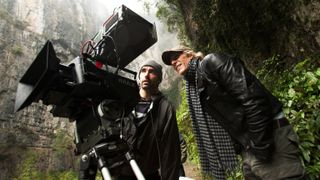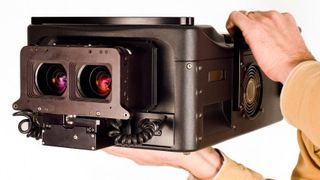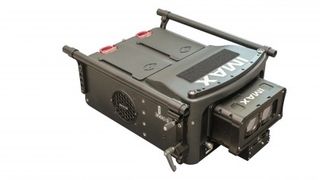IMAX CEO: our new digital 3D camera will offer a thrill ride never seen before
Seeing double on the big screen

IMAX made history this week when it announced the arrival of its first-ever 3D digital camera.
The 65mm 4K digital large-format IMAX 3D Digital Camera has been built to give filmmakers an easier way to shoot 3D movies - not just for the big screen but the 'big big' screen, making use of IMAX's vast picture palette.
A director using this camera will be able to shoot complex action scenes in 3D and for IMAX without the restrictions that came with older, bulkier and noisier IMAX cameras.
The fruits of the IMAX 3D digital camera will be seen in Transformers: Age of Extinction - Michael Bay is the first to use the technology - but will the new camera really be able to transform 3D movie making?
According to IMAX CEO Greg Foster it certainly can and when we see the results we will all be blown away.
"Michael Bay is taking IMAX 3D one step further with his use of our new IMAX 3D Digital Cameras. They are extremely compact so he was able to put them in places that were previously impossible for 3D cameras," said Foster to TechRadar.
"The result in IMAX theatres is going to be thrill ride that audiences haven't seen before."
Get daily insight, inspiration and deals in your inbox
Get the hottest deals available in your inbox plus news, reviews, opinion, analysis and more from the TechRadar team.
Shooting in 3D
Filming natively for IMAX has increased in recent years, with established filmmakers such as Christopher Nolan using the huge aspect ratios to make more immersive films.
Although Foster doesn't believe the new digital camera will convert Nolan - a stout film fanatic - he does think it will offer the best possible experience for those who like shooting in 3D.
"The new digital 3D camera isn't about replacing the IMAX film camera, it is providing filmmakers with another tool to use to achieve their creative vision," said Foster.
"Nolan loves film and I believe he will continue to shoot with IMAX film cameras for quite some time. We've actually never had greater demand for our film cameras than what we are seeing right now. We can't keep up with demand so we are actually creating more."

The aspect ratio that the new camera shoots at is 1.9:1, offering the viewer around 26% more of the image than standard cinemas. You can actually extract a 1.43:1 image from the ncamera as well, which is 40% bigger than standard cinema.
Given the new setup is smaller, lighter and easier to use than other 3D digital camera systems on the market, Foster is hoping filmmakers will take note and use the new equipment. He also understands, though, that 3D is just one side of what is going on at IMAX, albeit a rather lucrative one.
"We are format agnostic, so we design our technology to deliver the very best 2D and 3D experience," said Foster.
"When done right and in the appropriate film, such as Avatar or most recently with Gravity, we believe that 3D can be an extremely effective storytelling technique.
"The reaction to Gravity in IMAX 3D was phenomenal. In fact, it became our third highest grossing IMAX film of all time."
End-to-end approach
With Netflix injecting life into the movie on-demand market, big screen owners the world over are trying their hardest to entice movie watchers off of their sofas and into theatres but you need to have a USP. This is something Foster is aware of but he thinks that IMAX is in a better position than most.

"As technology in the home advances, audiences are looking for a better out-of-home experience and that positions IMAX well.
"Our end-to-end approach from capture through to presentation and our strong relationships with filmmakers allows us to offer moviegoers a differentiated experience they can't get anywhere else."
Marc Chacksfield is the Editor In Chief, Shortlist.com at DC Thomson. He started out life as a movie writer for numerous (now defunct) magazines and soon found himself online - editing a gaggle of gadget sites, including TechRadar, Digital Camera World and Tom's Guide UK. At Shortlist you'll find him mostly writing about movies and tech, so no change there then.
Most Popular





